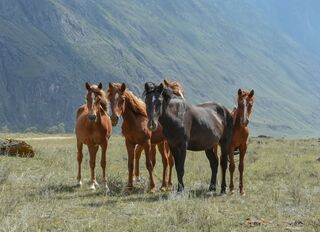Intelligence
Natural Curiosity in Horses
Curiosity drives intelligence, creativity, exploration, and motivation.
Posted December 12, 2022 Reviewed by Davia Sills
Key points
- The horse’s brain is designed to be cautious, but never to ignore new events or items.
- Horses are the only prey species that humans train to high performance levels.
- Horses have a strong sense of curiosity, once the immediate danger is past.
- Curiosity helps prey animals learn, in nature and in captivity.

Every now and then, an article pops up with a piece of surprising misinformation about horse brains. Recently, I read that horses are not curious. The idea behind this claim was that prey animals survive by being suspicious of their surroundings. It’s true that horses are prey animals. As such, their brains differ from ours in strong ways. And at first, they are cautious about approaching new sights, sounds, or smells.
Humans generally train predators with brains that are fundamentally similar to ours. Think about it: We train dogs, cats, dolphins, chimpanzees, gorillas, hawks, ravens, lions, and tigers. By contrast, prey animals include sheep, rabbits, deer, cattle, elk, and moose. Now, when was the last time you saw a trained rabbit or a high-performing moose? We don’t hop on and jump deer over a course of obstacles, drive rabbits from miniature sulkies, or race individual sheep around an oval track. Horses are the only prey species that humans routinely train, and we do so to very high performance levels.
Physically, horses do not have to allow human training. The first thing most neophytes notice when standing among a group of horses is that they’re huge. They’re also powerful, agile, and super-fast. A horse can easily swat a human to the side or dump us off his back at any moment. And a horse can’t be trained effectively by force. In addition to being cruel, abusive, and inhumane, it simply doesn’t work. So what is it about the horse’s brain that allows—even cooperates—with human training? Curiosity is a big part of the answer.
The horse’s natural sense of curiosity forms the basis for training.
Upon first experiencing a new sight, sound, or smell, young horses are scared. Equine brains are wired to run away instantly from any new or startling event—that’s survival kicking in, without which horses would have died out during their 56 million years of evolution. A horse can either be cautious, or she can become some predator’s dinner. The stakes are high!
But with humane, knowledgeable training, the same horse will observe carefully from a distance to determine the characteristics of the frightful event. If no further danger appears, the horse will begin to approach the item cautiously, often only a step or two at first. This approach is almost always indirect, a kind of sideways motion with the head low, ears forward, and nostrils wide open. She’s using her senses to explore, to find out what this stimulus is and whether it will harm her. If the initial approaches go well, the horse will march up and investigate. That’s curiosity!
We use horses’ natural curiosity to teach them to catch. For example, I spend many hours looking in the opposite direction when teaching young horses to come to me. They are rightfully suspicious at the start. If I face them, I’m a threat. But if I turn away, I’m a curiosity.
Curiosity gets the best of most horses. If I go about the quiet business of studying my feet, soon the youngster walks up behind me or from the side. She sniffs me, she waits to see what I will do, and she hangs around. From there, it’s easy to train the horse to come. OK, it’s relatively easy.
Without curiosity, it would be almost impossible to teach horses to jump, race, pull carriages, cut cattle, wear tack, or even be caught. But horses need curiosity in nature as well. They need to learn where predators live so that they can avoid them. The only way to do that is to explore. They have to find good grazing areas and fresh water. They need to know which times of year are best for those necessities. It would be dangerous to migrate 20 miles through deep snow to a source of water that’s always frozen.
Curiosity is a critical human trait in the development of intelligence, creativity, exploration, and motivation. The ways in which it supports similar abilities in the horse is still an open question, but curiosity likely plays an important role in all those aspects of equine behavior.
So, do horse brains display a natural sense of curiosity? You bet they do! And it’s the psychological foundation for their behavior in nature, captivity, and performance training.


